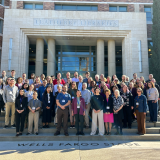Science Blender | Science Gone Wrong- Faking a Cure for HIV Student Essay from the HON 389 Science Blender Course
October 22, 2015
Throughout the year, we will be publishing essays from Professor Andrew Lyon‘s Honors 389 course “The Science Blender” . For the first paper this term, students were asked to investigate the idea of “science gone wrong”. Below is one student’s essay on the topic.
Science in the modern era has unveiled answers to many obscure problems of humankind. Frequently, news about a grand discovery appears in journals, and it is met by media attention, praise, validation and promising funding grants. However, the desire for fame and money has invoked in modern scientists the motivation to find loopholes to shorten their research. Starting with insignificant miscalculations, scientific fraud has evolved into serious legal issues. One of the recent examples of “science gone wrong” is the scandal of Dong-Pyou Han, who earlier in 2015 faced a jail sentence for his misconduct.
Dong-Pyou Han was a biomedical scientist and a former researcher at Iowa State University who engaged with a research team for an HIV vaccine 2008-2013. According to the journal Nature, in 2008, “Han spiked rabbit blood samples with human HIV antibodies so that the vaccine appeared to have caused the animals to develop immunity to the virus”.
With this faked discovery, he was able to receive millions of dollars from the National Institutes of Health (NIH). Although he proclaimed that this was just an accident, he failed to admit his falsified sample and instead continued his research. He later went on to join the research group recruited by Iowa University, which, as the Medical Daily cited, meant, “more grant money came in and that led to other researchers attempting to replicate the results.”
After several similar studies, in 2013, researchers from Harvard finally found the false sample in another test. The US Office of Research Integrity (ORI) cut the funding for Han, and he was forced to resign from Iowa State University. This was the end for Han’s career, yet it was the beginning of his legal troubles.
Han’s case has showed how the phrase “science gone wrong” extends into administrative systems. The case was further investigated by Senator Charles Grassley of Iowa, “who has a history of investigating misconduct in the biomedical sciences,” according to Nature. The federal agencies finally charged Han with felony in court earlier in 2015. Han was sentenced to 57 months in jail and fined $7.2 million for his misconduct.
The case was not only a serious incident for the scientific research field but also for the legal system that supports it. The NIH and the ORI institutions, which were primarily in charge of the case, could not directly investigate and had to refer to another agency for inspections. The two also did not cooperate well on the case, and even stated that, “benefit of criminal prosecution is unclear.” By practicing loose regulation, they had allowed Han to prolong his fraudulent research. In general, those institutions have opened the possibility of many more future instances of “science gone wrong”.
The case of Dong-Pyou Han has added another serious scandal to the science field. It not only reflects the term “science gone wrong,” but also sets a notorious example of both scientists’ misconduct and administrations’ mismanagement.
About Honors 389: The Science Blender
Throughout Professor Lyon’s Science Blender course, students identify knowledge gaps that prevent simple solutions to grand challenges, and then they develop strategies to address those gaps. In this process, students also become more conversant in the languages of different disciplines and how team-based problem solving benefits scientific pursuits.


